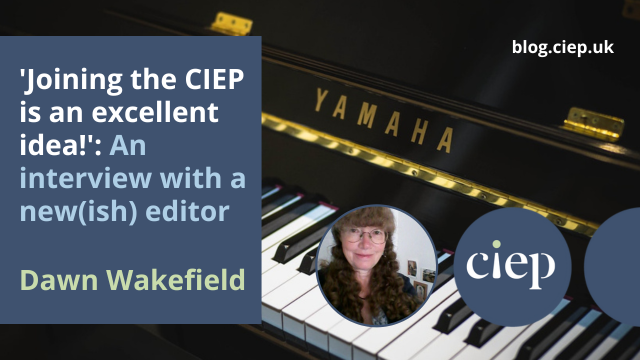After a long career as a piano teacher, Dawn Wakefield entered the professional editorial world at the end of 2019 and is now an Intermediate Member of the CIEP. In this post, she shares her experiences as a new proofreader and editor and explains how it’s a continuous learning process.

Why did you decide to become an editor/proofreader?
I have always had a good eye for detail (sometimes annoyingly so!) and have sporadically done proofreading jobs informally for friends over many years. As I suddenly found myself obliged to keep working into my sixties, which I was not previously expecting, I liked the idea of doing some work that was less appointment-based and thus had more flexible working hours. When Covid severely reduced my long-standing music teaching business, having a new career became a necessity rather than just a wish.
What training have you done?
So far, I have completed CIEP’s Proofreading 1 and Proofreading 2 courses and also the introductory Copyediting 1 course. I have also found all the very informative talks at the three online CIEP conferences I have attended extremely useful.
The courses have also been very useful, both in extending my knowledge and in showing me how much more there is still to learn! I struggled most with the fact I often had to make decisions under assessment that in real life I would have consulted with my client about, so that small aspect was very different from the practical experience of carrying out my work.
Why did you join the CIEP?
Julia [Sandford-Cooke, longtime CIEP member and longtime friend of Dawn’s] said it was a good idea! Seriously though, I knew I had skills in this area but I needed to gain some qualifications in order to work for people beyond my usual circle of contacts.
What benefits have you had from being a member of the CIEP?
The best thing has been the helpfulness and friendly supportiveness of my local Norfolk group. I have learned a lot from attending the meetings and have gained a network of more experienced editors who are very willing to help with editing issues. There is also the almost-overwhelming amount of information available on the CIEP website, which I am still slowly progressing through, and the regular emails also supply more information than I can keep up with at times.
Have you joined any other groups?
As a result of connections made at the 2021 CIEP conference, it was decided to set up a Music Special Interest Group (SIG), and I am enjoying being the coordinator of this group and getting to know other musical-minded editors internationally.
Do you have a website?
I already have a website for my music teaching business, but have not felt ready to set up my own website for editing as yet. However, soon after joining CIEP I joined the Norfolk editors group website NPEN, which has proven useful as a way of having a web presence, looking credible professionally and also gaining some work as a result. Impressed by the effectiveness of this, I am now also part of the new group website for CIEP music editors, Find a Music Editor (FAME).
Do you have a social media presence?
I am on LinkedIn and also Twitter. I tend to use Facebook and Instagram for more personal input, but not exclusively so.
How did you go about finding clients?
Despite not having much of an editorial presence on Facebook, building connections with other pianists through Facebook groups has been very useful, and has led to several piano-related proofreading and fingering jobs. I need to do more marketing but have been lucky to find clients through personal contacts, and also through being on the NPEN website. Telling absolutely everyone you can think of about what you are doing … is a good plan!
You were already self-employed – has your previous experience/processes been useful? What have you needed to change?
I have always enjoyed running my own business, so I am used to that responsibility and discipline. Working for independent authors has been similar in experience, but I have found adapting to working for larger companies more challenging.
Did you have to buy new equipment/software?
So far, my outlay in this direction has been quite modest. I needed a second screen, but for now I am borrowing one. The purchase of a more up-to-date laptop is imminent, but I have managed OK for three years on what I had. I found myself buying plenty of textbooks. Actually, I buy more books generally now because editing has renewed my enthusiasm for reading again, particularly fiction, which I rarely used to read at all. Now I need to invest in more bookshelves!
What skills from being a music teacher do you bring to your work as a proofreader?
Working independently. Also, I see quite a few similarities in the skills involved in listening to a piano pupil and correcting their errors, as well as helping them to find the best way of expressing themselves and the music. This relates in many ways to correcting text and making suggestions to help an author communicate clearly and effectively with their readers.
What has surprised you most about your new career?
The huge amount there is to learn! Especially if you want to be at the top of this profession – an Advanced Professional member – I should have started sooner …
What do you wish you’d known beforehand?
I wish I had more IT expertise! I have learned a lot quite quickly, but there is long way to go …
I would have really welcomed some more structured guidance from the CIEP specifically for new members. There is lots and lots of information on the website, so it can be difficult to know where to start and what order to do things in. I keep discovering things that I wish I had known sooner.
What do you like best about proofreading?
The satisfaction of seeing the finished publication. Also, any opportunity to put all my musical and linguistic skills into action. A recent highlight was proofreading and piano fingering for the book HerStory by Karen Marshall for Faber Music; it made use of my editing skills, piano skills and European language knowledge all in one project … and promoted many exceptional female composers. [Editor’s note: This book was actually a finalist in the Outstanding Music Education Resource Category for the 2023 Music and Drama Education Awards.]
I also enjoy the sheer variety of materials you get to work on; I can see why editors become good quiz team members!
What do you like least?
Publishers who send you second or final proofs with no notice and expect you to turn them round in 24–48 hours. It seems to happen more than I would wish.
What would be your top pieces of advice?
If you are just starting out, joining the CIEP is an excellent idea! Being part of a friendly professional organisation is really invaluable.
It’s a good idea to put aside plenty of time and also finance for taking training courses and studying in your first few years, as in the longer term that will open up more work opportunities. I have yet to get the balance of this sorted. Better forward planning would be helpful rather than focusing on immediate income and struggling to find the time and money for further studies.
About Dawn Wakefield
 Dawn Wakefield, based in North Norfolk UK, is both an editor and a professional piano teacher. Her editing work draws on both her recent training with the CIEP and a lifetime of skills and knowledge gained while teaching music and also Balkan dancing! As well as specialising in music-related proofreading, she regularly works in a variety of non-scientific subject areas, including the arts, philosophy, alternative therapies and spirituality.
Dawn Wakefield, based in North Norfolk UK, is both an editor and a professional piano teacher. Her editing work draws on both her recent training with the CIEP and a lifetime of skills and knowledge gained while teaching music and also Balkan dancing! As well as specialising in music-related proofreading, she regularly works in a variety of non-scientific subject areas, including the arts, philosophy, alternative therapies and spirituality.
 About the CIEP
About the CIEP
The Chartered Institute of Editing and Proofreading (CIEP) is a non-profit body promoting excellence in English language editing. We set and demonstrate editorial standards, and we are a community, training hub and support network for editorial professionals – the people who work to make text accurate, clear and fit for purpose.
Find out more about:
Photo credits: piano by Pixabay, sheet music by Ylanite Coppens, both on Pexels.
Posted by Belinda Hodder, blog assistant.
The views expressed here do not necessarily reflect those of the CIEP.







